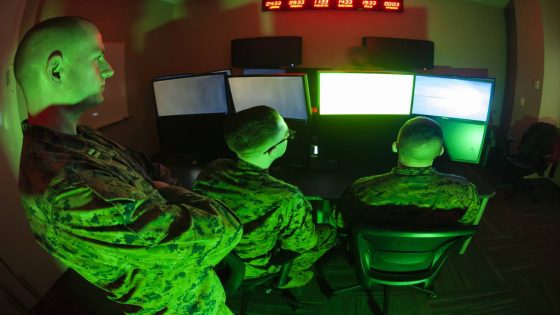U.S. Marines with cyber expertise are deploying to Japan on a mission to bolster networks and critical infrastructure the military relies on across the Indo-Pacific.
Marines assigned to Marine Corps Forces Cyberspace Command will join the III Marine Expeditionary Force in Okinawa, in what the service described as a novel âcyber rotational force concept.â An announcement shared by the Corps on March 22 did not disclose how many people would make the move.
The U.S. Department of Defense is increasingly concerned with the security of the digital tethers that connect troops across the globe. Officials have warned that cyberattacks on critical infrastructure â such as water and energy sectors, health care providers, and defense suppliers â in the Indo-Pacific could sap U.S. military capabilities.
âEnsuring we have the skills and resources to maintain resilient, reliable networks to support rapid decision-making at every level is at the heart of what we do,â Maj. Gen. Ryan Heritage, the leader of MARFORCYBER, said in a statement. âThis is just another step in realizing that goal.â
Shielding Marine infrastructure from attacks of all kinds including cyber is one focus of the Installations and Logistics plan the Corps unveiled last year. The Defense Department has since 2015 experienced more than 12,000 so-called cyber incidents, with yearly totals falling since 2017, according to the Government Accountability Office.
Lt. Gen. William Jurney, the Marine Corps Forces Pacific commander, said resilient connectivity is crucial to future fighting. Both Russia and China wield sophisticated cyber arsenals and are expected to use them to sow chaos at the outset of a conflict, according to the Defense Departmentâs latest cyber strategy.
âProtecting critical networks located inside the weapons engagement zone of several regional adversaries is essential to our ability to physically and virtually maneuver,â Jurney said in a statement. âAs the threat to our critical cyber infrastructure evolves, it is essential that the Marine Corps be able to defend our forward-deployed networks.â
Marine Corps Times reporter Irene Loewenson contributed to this article.
Colin Demarest is a reporter at C4ISRNET, where he covers military networks, cyber and IT. Colin previously covered the Department of Energy and its National Nuclear Security Administration â namely Cold War cleanup and nuclear weapons development â for a daily newspaper in South Carolina. Colin is also an award-winning photographer.
Source Agencies



